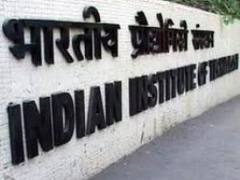
Mumbai, May 19: Each year boys max out seats at the Indian Institutes of Technology. But the count of girls who secured JEE ranks has doubled to 2,886 since the last edition of the exam. Yet, the tech schools will on another front continue to be an unequal world: students from the IIT-Bombay zone (home to Kota) dominate the list of selected candidates. But the southern zone has bagged the credit for having eight of the top 20 rankers, most from Andhra Pradesh.
B-town boys have bagged the top ranks: Faridabad's Arpit Agrawal topped the JEE with a score of 385 (out of 401); he is followed by Chandigarh's Bijoy Singh Kochar and Bhilai's Nishanth Koushik.
Priya Inala--all-India rank (AIR) 21--from AP is the girls' topper. Science is this Asian Physics Olympiad gold medallist's first love. She is joined by two other girls in the top 100. This year, 1.5 lakh girls took the JEE free of cost. Clearly, the plan to not charge them worked: the headcount of successful girls is exactly double of last year's 1,443.
Three boys tied at the score of 369: Jaipur's Nishit Agrawal (AIR 6; Bombay zone topper), Anant Gupta (AIR 7; Roorkee zone) and Kandivli's Manik Dhar (AIR 8; Maharashtra topper). Competition was compounded by the fact that JEE 2012 was tougher than its predecessor. "The cut-off has dropped to 172. Last time, it was 229. The difficulty level has indeed gone up," said Avinash Mahajan, IIT-Bombay's JEE chairman.
An analysis of the top 100 students shows that 31 hail from the western zone and 38 from the Madras zone. The Bombay zone also has the highest number of candidates in the top 1,000--294. Of all the seven zones (prepared on the basis of the old IITs), the western region saw the largest pool of students who qualified--4,239. Of these, 491 are girls. As many as 73,351 candidates took the test from this zone.
The Madras zone, from where 71,981 candidates sat for the JEE, will send 3,666 candidates to the 15 tech schools.
Closer home, only 599 of the 4,696 students who sat for JEE from Mumbai qualified; of the 22,331 who appeared for the exam from Maharashtra, 1,796 made it.
Out of 33,057 candidates from Jaipur, many of whom prepared from coaching centres in Kota, 2,677 made the cut. A total of 4.8 lakh candidates appeared for JEE. Of them, 17,462 have been short-listed for the counselling process for admission to the IITs. But 24,112 have secured ranks and can join other colleges that accept JEE scores.
JEE chairman G D Reddy said that across India, the report card of reserved category students had improved. "There will not be any preparatory programme for SC/ST students this year. Only 124 students from the physically challenged category have been short-listed for the preparatory programme."
Of the 4,805 OBC candidates who qualified, 1,625 made it to the common merit list. Of the 3,464 SC and 654 ST students who qualified, about 300 made it without the handicap of score relaxation.
Nishanth Rumandla (AIR 4) is the OBC topper; Zubin Arya (AIR 94) came first on the SC merit list; and Vikas Meena (AIR 642) topped the ST merit list.
In all, the 15 IITs, IT-BHU and ISM, Dhanbad, have 9,647 seats, apportioned as: 4,722 for the general category, 2,101 for OBCs, 434 for minority OBCs, 1,403 for SCs, 708 for STs and 279 for physically challenged students.





Comments
Add new comment